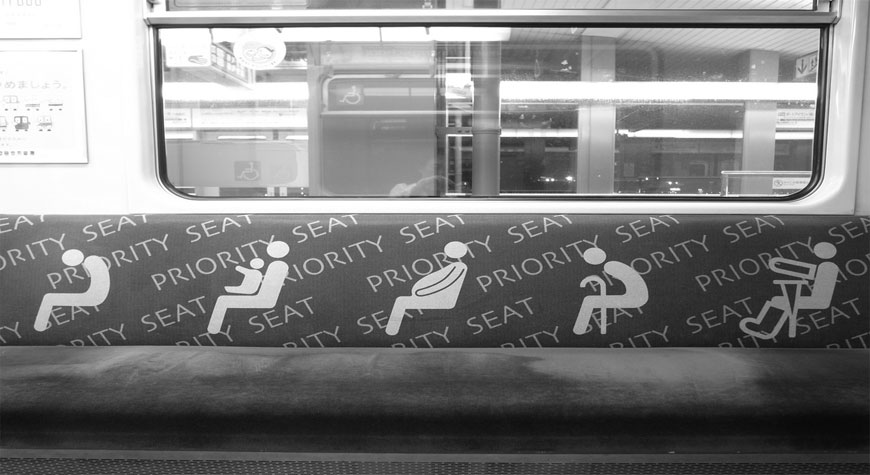I have been such a gentleman for ever so long.
I open doors for people – office doors, car doors, doors in general. I precede people on the down stairway or make them go first going up the stairs (either way, if they fall, they fall on me). I can also take long walks with a friend and manage to keep myself on the outside of the sidewalk (exposed to the traffic) no matter how many times we cross the street. And I do it so seamlessly that I don't miss a word of the conversation. I give people my arm when there are small steps to take. I also give up my seat on the bus.
I know, I know. I am a woman and therefore I mustn't be doing these gentlemanly things, right? I should behave like a lady. Well, my upbringing (care of an obsessed aunt) impressed upon me that manners are a game, with each player knowing what the rules are for herself and others. You have to know what the gentleman is supposed to be doing, my aunt said, so both of you move graciously together in a mannered way.
But it's one thing to know how a gentleman is to behave so that you don't get in the way of his actions, and another to actually do these things. And, as I have said, I have not been a lady at all. I have been a gentleman.
Am I confessing to a sudden desire to become a transman and change my gender identity? Well, no. Though, I consider it part of good manners not to second-guess anyone about their stated and preferred gender identity. Is this some feminist political correctness game, meant to embarrass well-mannered men, who had an aunt like mine? Not really. It's just that gentlemanly ways always made sense to me.
Caring for others
I would always give up my seat to the pregnant or infirm in the bus. I did this even when I was in my teens. The lady in me always wondered why the men in the bus didn't beat me to it. The budding feminist didn't get too upset. After all, I was strong, able -bodied and trying to do an act of kindness.
But the gentleman in me really kicked in once I started to raise my kids and my parents got older and weaker. All the things I learned from my aunt about what gentlemen are supposed to do, made sense in ensuring the safety of my kids and parents. Open the door to ensure they got into the car first? Of course. Open the door to help them out of the car to ensure they did not get sideswiped? Sure.
Make them walk ahead of me in the mall so I had my eyes on them all the time? Naturally. Be sure that I was always walking exposed to the traffic when we would take long walks in UP Campus? A no-brainer. Give my arm to my partially blind father so he could navigate a few steps? Logical. Precede my mother down the stairs so she could hold on to me in case she lost her balance? Well, I would have done far more for my parents and my kids.
Indeed as my kids started to become teens and young men, I had a hard time reverse-engineering their movements. Fully grown and able-bodied, I needed them to learn the automatic movements that make for a polite and caring person.
But they had grown up with the expectation of a strong and protective mother, moving unobtrusively in gentlemanly mode, such that their movements were unimpeded.
As this had been their earliest and therefore deeply unconscious body knowledge, their unlearning in order to role-reverse (that is, I was now to be treated as the weak one) was difficult at first. My kids are kindhearted souls actually, and can often be called upon to help the weak. But when I began reverse-engineering their behaviors towards me, I was strong and quite capable of taking care of myself.
So their hearts gave them no motivation to treat me like a lady. Yet I needed to invest despite their occasional irritation and the inevitable teasing: “Some feminist you are, Mama. You're just hoity-toity upper class.”
When manners are sexist
There is just one objection I have, as a feminist, to good manners. The automatic assumption that men do these things for the weak, meaning children, women and the elderly. All women are weaker than all men? Me? Weak? Unacceptable insult. All elderly people are weak? Heavens! If I were not such a lady I would be cursing now.
Feminism is about equality, but it is also about protecting the weak. So where there is someone who is weak, though he be a man, we must practice these good manners, even if those who practice it are women.
My friend and I were talking about this sometime ago. Her father who is pushing 90 got dizzy in a public place. Guess who stood up and gave him a seat? The one who inquired about him and offered any additional help? A nice OLD lady. Or maybe we should call her a nice gentlemanly crone.
This is why feminists don't like to be called ladies, by the way. It implies that feudal system of manners where all women are weak. The younger hoi polloi milled about, oblivious. They were too self-absorbed to say bad things about the woman who dared to reverse the ageist and sexist expectations and be good mannered towards a man.
Daily practice of kindness
As long as it is not suffused with the underlying assumption of the weakness of women, manners make sense. Civility and socially accepted ways of doing things make life easy for everyone.
I just hate it when people during family meals forget to pass food in front of them to others. I hate it when dinner talk, say about the philosophy of Immanuel Kant, gets interrupted by requests to pass the fried chicken. And because kind and other-focused moi happens to always hear these requests, while the boor who should pass the chicken is talking about his dislike of moral imperatives, I have to pass the fowl. I am sure, that my thoughts on Kant would be far more erudite than that of the boor. He should stop talking and pass the tinola if he was raised properly. My point? Can people please just practice good manners so we can all have a good time?
I needed to invest in my children's manners to increase their capacity to think of others. Good manners and right conduct isn't, as some believe, just some frivolous upper class thing that is best left to the dying generation of grandmothers.
It is about treating the other person, regardless of race, sex and class with respect. It is daily practice in compassion and caring. It is also quite a necessary set of skills if you want to ensure the safety of those you love who are weaker than you.
Such values are at the core of every worthy human undertaking. As the students demonstrating in Hong Kong for democracy have shown, good manners and right conduct can be excellent tactics when taking on a powerful entity such as the Chinese Communist Party. Pro-Beijing goons have been disrupting the demonstrations but they do not win over people by their thuggish behavior.
Feminist manners
Indeed part of the feminist backlash that I get is, “I don't know how to behave around feminists. Even my good manners which my mother taught me are derided.”
I always think when men say this, that their mother taught them the rules of the game, but not its meaning. Because good manners from start to finish is about making the other person comfortable. As I said, it is an exercise in selflessness. A daily exercise. Like meditation.
I can tell when I am treated as a lady out of kindness or when I am treated like a lady as a form of condescension. I have an uncle who would have lunch with me on family business but would never hear of me picking up our tab.
“Never in this family,” he would say.
And I, a feminist would say, “Oh good, next time I want to eat pho in Hanoi.”
I understand that my uncle has no doubt about capacities, economic or otherwise. His offer to pay is just him. Just him, loving me.
On the other hand, please gentlemen, don't say things like, “I won't argue with a lady,” when what you actually mean is that you've lost the argument but can't concede to the “weaker” sex.
So try and figure it out, kind sirs. If the woman feels that no fuss should be made about her, then try not to be so fussy. If she opens the door for you because she reached it first, accept the kindness too, and walk through the door with great aplomb. Do not consider it an insult to your manliness. And do, please, get up for the weak. If you do that, even to the detriment of our conversation about the theory of relativity, you will still earn pogi (handsome) points.
And if some bad-mannered woman, citing feminism, decides to make your well-meaning acts of kindness an issue, behave as the etiquette book teaches. Say “I beg your pardon, madam. It will not happen again.” Then erase her name from your little black book. She certainly does not deserve the pleasure of our company when we talk about existentialism over gulaman and fish balls.
About Sylvia Estrada-Claudio
Sylvia is a doctor of medicine who also holds a PhD in Psychology. She is Professor of the Department of Women and Development Studies, College of Social Work and Community Development, University of the Philippines, and the co-founder and Chair of the Board of Likhaan Center for Women's Health.
*This story was first published in Rappler.com, a Manila-based social news network where stories inspire community engagement and digitally fuelled actions for social change.








Comments